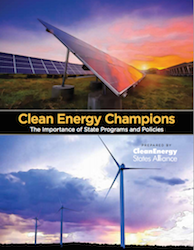The Clean Energy States Alliance (CESA) has released a new report, “Clean Energy Champions: The Importance of State Programs and Policies“. The report provides a comprehensive look at the ways in which states are supporting clean energy as well as offers suggestions on how to further encourage growth.
The report includes 31 case studies form 22 states covering various clean energy programs including Renewable Portfolio Standards, renewable energy tax credits, rebates and other less known programs used to develop the clean energy industry.
 “Over the past decade and a half, states across the country have implemented innovative policies that have achieved significant, measurable results,” said Warren Leon, executive director of CESA. “This report clearly outlines how renewable energy production has far surpassed expectations and created a thriving clean energy sector. We must sustain this momentum by supporting various initiatives at the state level, working in tandem with federal agencies, and advancing clean energy with continued bipartisan support.”
“Over the past decade and a half, states across the country have implemented innovative policies that have achieved significant, measurable results,” said Warren Leon, executive director of CESA. “This report clearly outlines how renewable energy production has far surpassed expectations and created a thriving clean energy sector. We must sustain this momentum by supporting various initiatives at the state level, working in tandem with federal agencies, and advancing clean energy with continued bipartisan support.”
In examining the state’s role in clean energy development over the past 15 years, the report identifies seven lessons to consider for the continued growth of clean energy into the future. Those lessons cover the following:
- The significance of state experimentation and the ways states can continue to innovate to move the clean energy sector forward;
- The need for the states to strengthen their existing consumer protection role regarding clean energy technologies;
- The approach states should take when modifying distributed generation policies;
- The value of continuing to address clean energy policy in a non-partisan manner;
- The specific research analysis the federal government should undertake to assist the states;
- The role of federal tax incentives in leveraging state initiatives for clean energy market growth; and
- The importance of structuring EPA’s Clean Power Plan in ways that support existing state clean energy initiatives.
In addition, the report found four key areas where state activity has made significant progress to overcome market barriers: developing the clean energy supply;
overcoming barriers by building the infrastructure for clean energy growth; building a vibrant clean energy industry; and protecting and including consumers.

